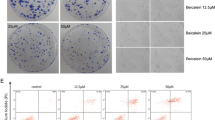Abstract
The antitumor effects of curcumin have attracted widespread attention worldwide. One of its major functions is to induce the apoptosis of tumor cells, but the antitumor mechanism is currently unclear. In the present study, we found that cell mortality and curcumin concentration were dose dependent. Curcumin of low concentrations (10 μΜ) could reduce the level of reactive oxygen species (ROS) in tumor cells, while curcumin of high concentrations (80 μΜ) was able to significantly increase the content of ROS. In addition, Western blotting detection suggested that curcumin of high concentrations can induce the release of Cyto-C and the activation of Caspase-3, and that ROS scavenger NAC apparently inhibits apoptosis protein release and activation, consequently slowing the curcumin-induced apoptosis. Taken together, curcumin further activates the mitochondrial apoptotic pathway by inducing cells to generate ROS and ultimately promotes the apoptosis of tumor cells.




Similar content being viewed by others
References
Malik M et al. Curcumin, a nutritional supplement with antineoplastic activity, enhances leiomyoma cell apoptosis and decreases fibronectin expression. Fertil Steril. 2009;91(5 Suppl):2177–84.
Menon LG, Kuttan R, Kuttan G. Inhibition of lung metastasis in mice induced by B16F10 melanoma cells by polyphenolic compounds. Cancer Lett. 1995;95(1–2):221–5.
Yang Fuwen HJ, XiaoIan L, Zenian Z, Xianming C. Apoptosis in nasopharyngeal carcinoma cell line NCE induced by curcumin and its molecular mechanism. Chin J Otorhinolaryngol Head Neck Surg. 2006;41(8):612–6.
Liang Weijiang Z, Yan X, et al. Study on curcumin inhibiting gastric adenocarcinoma cell line SGC7901 proliferation and epidermal growth factor receptor expression. Chin J Gastroenterol. 2006;11(7):400–3.
Liang HH, Wei PL, Hung CS, Wu CT, Wang W, Huang MT, et al. MicroRNA-200a/b influenced the therapeutic effects of curcumin in hepatocellular carcinoma (HCC) cells. Tumour Biol. 2013. doi:10.1007/s13277-013-0891-z.
Zhao Dongli XX, Mingzhong L, Shuwen W. Experimental study on the anticancer effect of curcumin on mice of S180 in vivo. J Xi’an Jiaotong Univ. 2007;28(1):70–3.
Odot J et al. In vitro and in vivo anti-tumoral effect of curcumin against melanoma cells. Int J Cancer. 2004;111(3):381–7.
Park MJ et al. Curcumin inhibits cell cycle progression of immortalized human umbilical vein endothelial (ECV304) cells by up-regulating cyclin-dependent kinase inhibitor, p21WAF1/CIP1, p27KIP1 and p53. Int J Oncol. 2002;21(2):379–83.
Anto RJ et al. Curcumin (diferuloylmethane) induces apoptosis through activation of caspase-8, BID cleavage and cytochrome c release: its suppression by ectopic expression of Bcl-2 and Bcl-xl. Carcinogenesis. 2002;23(1):143–50.
Choudhuri T et al. Curcumin induces apoptosis in human breast cancer cells through p53-dependent Bax induction. FEBS Lett. 2002;512(1–3):334–40.
Holy JM. Curcumin disrupts mitotic spindle structure and induces micronucleation in MCF-7 breast cancer cells. Mutat Res. 2002;518(1):71–84.
Squires MS et al. Relevance of mitogen activated protein kinase (MAPK) and phosphotidylinositol-3-kinase/protein kinase B (PI3K/PKB) pathways to induction of apoptosis by curcumin in breast cells. Biochem Pharmacol. 2003;65(3):361–76.
Zhu Qing ZW, Suhu L, et al. Study on curcumin-induced apoptosis of human HepG2 cells. Shanxi Med J. 2005;34(10):l185–l1186.
Huang Dongsheng CJ, Jiliang W. Experimental study on the inducing apoptosis of human SPC -A1 cells by curcumin. J Xianning Med Coll. 2002;16(4):251–5.
Jing EAZ. Anti-tumor effect of curcumin on human cervical carcinoma HeLa cells in vitro and in vivo. Chin J Cancer Res. 2007;19(1):32–6.
Aoki H et al. Evidence that curcumin suppresses the growth of malignant gliomas in vitro and in vivo through induction of autophagy: role of Akt and extracellular signal-regulated kinase signaling pathways. Mol Pharmacol. 2007;72(1):29–39.
Tomita M et al. Curcumin (diferuloylmethane) inhibits constitutive active NF-kappaB, leading to suppression of cell growth of human T-cell leukemia virus type I-infected T-cell lines and primary adult T-cell leukemia cells. Int J Cancer. 2006;118(3):765–72.
Pan Guofeng ZX, Xiaoxin Z. An updated study on anti-tumor effect and mechanism of curcumin. Pharmacol Clin Chin Mater Med. 2007;23(5):247–51.
Moragoda L, Jaszewski R, Majumdar AP. Curcumin induced modulation of cell cycle and apoptosis in gastric and colon cancer cells. Anticancer Res. 2001;21(2A):873–8.
Zheng Liduan TQ, Cuihuan W. Inhibitory effects of curcumin on apoptosis of human ovary cancer cell line A2780 and its molecular mechanism. Chin J Cancer. 2002;21:1296–300.
Jing Z et al. The effects of curcumin on proliferation and apoptosis of human cervical carcinoma Hela cells in vitro. J Chongqing Med Univ. 2004;29(3):296–298,314.
Bush JA, Cheung Jr KJ, Li G. Curcumin induces apoptosis in human melanoma cells through a Fas receptor/caspase-8 pathway independent of p53. Exp Cell Res. 2001;271(2):305–14.
Conflicts of interest
None
Author information
Authors and Affiliations
Corresponding author
Rights and permissions
About this article
Cite this article
Chang, Z., Xing, J. & Yu, X. Curcumin induces osteosarcoma MG63 cells apoptosis via ROS/Cyto-C/Caspase-3 pathway. Tumor Biol. 35, 753–758 (2014). https://doi.org/10.1007/s13277-013-1102-7
Received:
Accepted:
Published:
Issue Date:
DOI: https://doi.org/10.1007/s13277-013-1102-7




